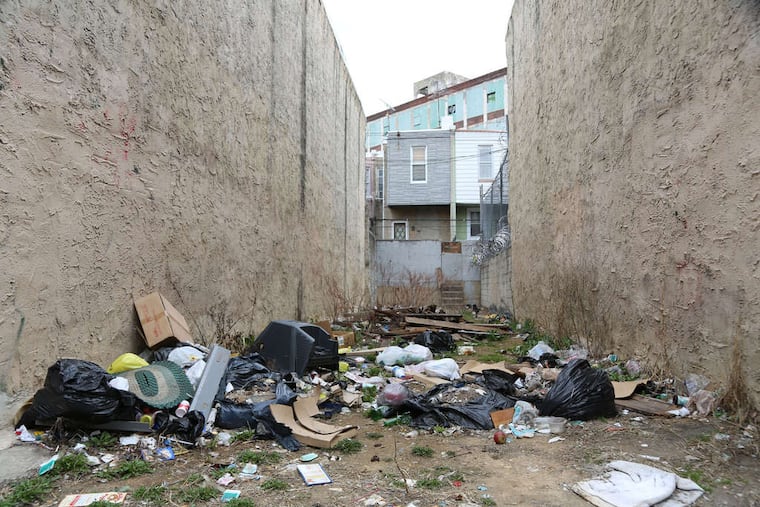Philly residents plagued by illegal dumping tell city to invest in solutions
City Councilmember Jamie Gauthier is pushing to increase spending for illegal dumping enforcement.

A mountain of construction debris discarded on the sidewalk. A lonely couple of mattresses next to a baseball field. A dozen old tires stuffed inside an abandoned speedboat.
If piles of illegally tossed trash were an art form, Philadelphia would be the Sistine Chapel.
And as with many quality-of-life issues, illegal dumping got worse during the pandemic.
With budget season in full swing, City Councilmember Jamie Gauthier is pushing to restore funding for basic city services, and illegal dumping enforcement is high on the list. Gauthier said the $2 million for illegal dumping in Mayor Jim Kenney’s proposed budget doesn’t scratch the surface, and her plan calls for more than doubling the budget to $5.25 million to beef up enforcement.
“No matter what neighborhood you live in, no matter what your zip code is, you deserve to have a safe, clean street,” Gauthier said at a hearing on the issue Thursday.
Terrill Haigler, known on social media as “Ya Fav Trashman,” left his job as a sanitation worker to become an advocate for clean streets in his famously filthy hometown. He now organizes volunteer cleanups.
But at the city’s worst illegal dumping hot spots, the work often feels fruitless.
“Every three weeks, I get a call asking me to come back,” Hagler told city officials Thursday. “We just removed 10 tons. How could I need to come back?”
The good news: The city knows where the problem is worst.
The Streets Department monitors 130-plus hot spots each day that account for most of the 200 to 400 illegal dumping complaints filed each month — and it’s no secret they’re not anywhere near Rittenhouse Square.
While the city has diverted resources from quality-of-life issues to focus on gun crime, Gauthier argues that investment in trash reduction is also a violence prevention tool.
City Controller Rebecca Rhynhart’s office analyzed 311 data and found only 3.1% of claims came from seven zip codes in Center City, while 14 zip codes outside the city’s core that have the highest rates of gun violence accounted for 56% of all illegal dumping reports.
The bad news: There’s no long-term fix right now.
Nic Esposito, the former trash czar for the Kenney administration whose office was eliminated in 2020 due to a budget shortfall, said the city had a plan that was working prior to the pandemic.
His office saw decreases in illegal dumping after rolling out surveillance cameras, increasing fines, and warning bad actors that City Hall was watching.
“All of that has been abandoned by this administration,” Esposito said Thursday. “The whole reason we’re having this hearing is because of [this] short-sighted decision.”
Esposito said the city should bring back a centralized office and continue implementing scuttled aspects of the anti-litter plan, like requiring tire dealers to register for special licenses and relaxing rules at city sanitation centers to allow contractors to drop off smaller truckloads for a nominal fee.
Mike Carroll, the deputy mayor who oversees the streets, acknowledged the budgetary constraints. The Streets Department has “picked up the pieces as much as possible,” he said, but did not provide a long-term plan for the problem.
“We still have a lot of core service issues to get on track with,” Carroll said.
Mark Harris, from Cathedral Park Community Development Association in West Philly, said more police enforcement would go a long way, using the surveillance infrastructure that is already in place.
Since the pandemic, arrests and citations for illegal dumpers have dropped precipitously. Only one offender was arrested all of last year.
“There’s a difference between zero arrests and not being able to arrest out of the problem,” Harris said. “There needs to be balance.”
» READ MORE: Here’s what’s in Mayor Jim Kenney’s $5.6 billion budget proposal
The lack of enforcement may come at a high cost for taxpayers, too. According to a 2020 statewide survey, Philadelphia spends $48 million per year dealing with its trash-infested streets — by far the highest in the commonwealth, even accounting for population and size difference. About 90% of that money goes toward cleanup rather than prevention.
Streets Commissioner Carlton Williams said the department monitors complaints every day and attacks the list of hot spots. But the department was hamstrung through the pandemic by an unprecedented spike in trash collection citywide, largely attributed to people staying home and producing more waste.
Illegal dumping enforcement took a hit and offenders “have become more brazen in their acts,” Williams said.
Williams said the $2 million request in the current budget proposal would allow the Streets Department to double its illegal dumping prevention crews next year, and focus on stopping the dumping rather than reacting to complaints.
Lawmakers have until June to negotiate amendments and haggle over departmental financing. The next budget goes into effect July 1.
The Philadelphia Inquirer is one of more than 20 news organizations producing Broke in Philly, a collaborative reporting project on solutions to poverty and the city’s push toward economic justice. See all of our reporting at brokeinphilly.org.